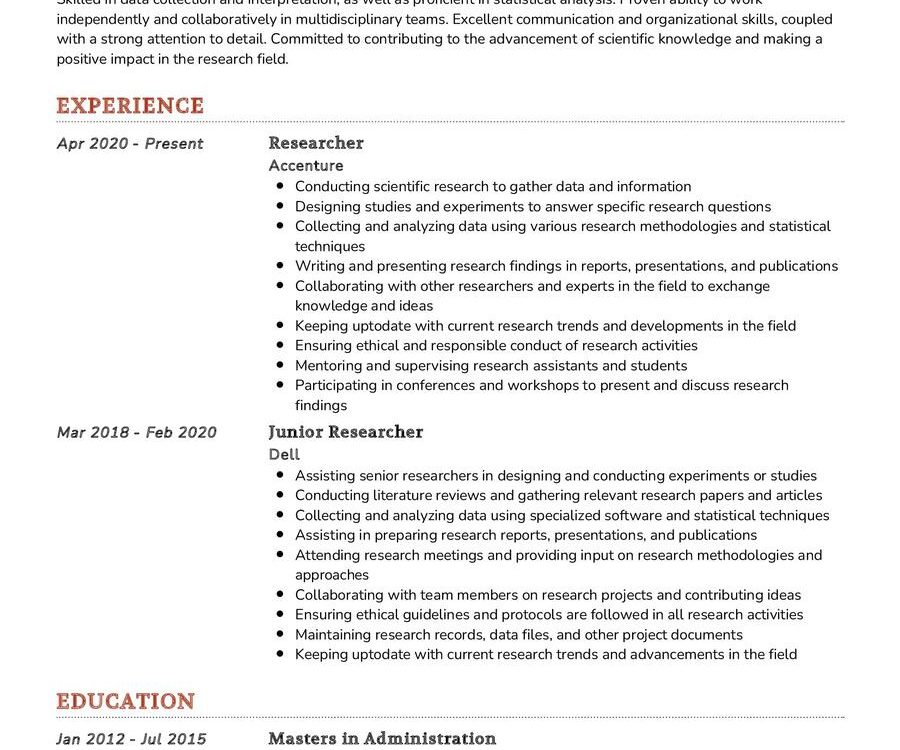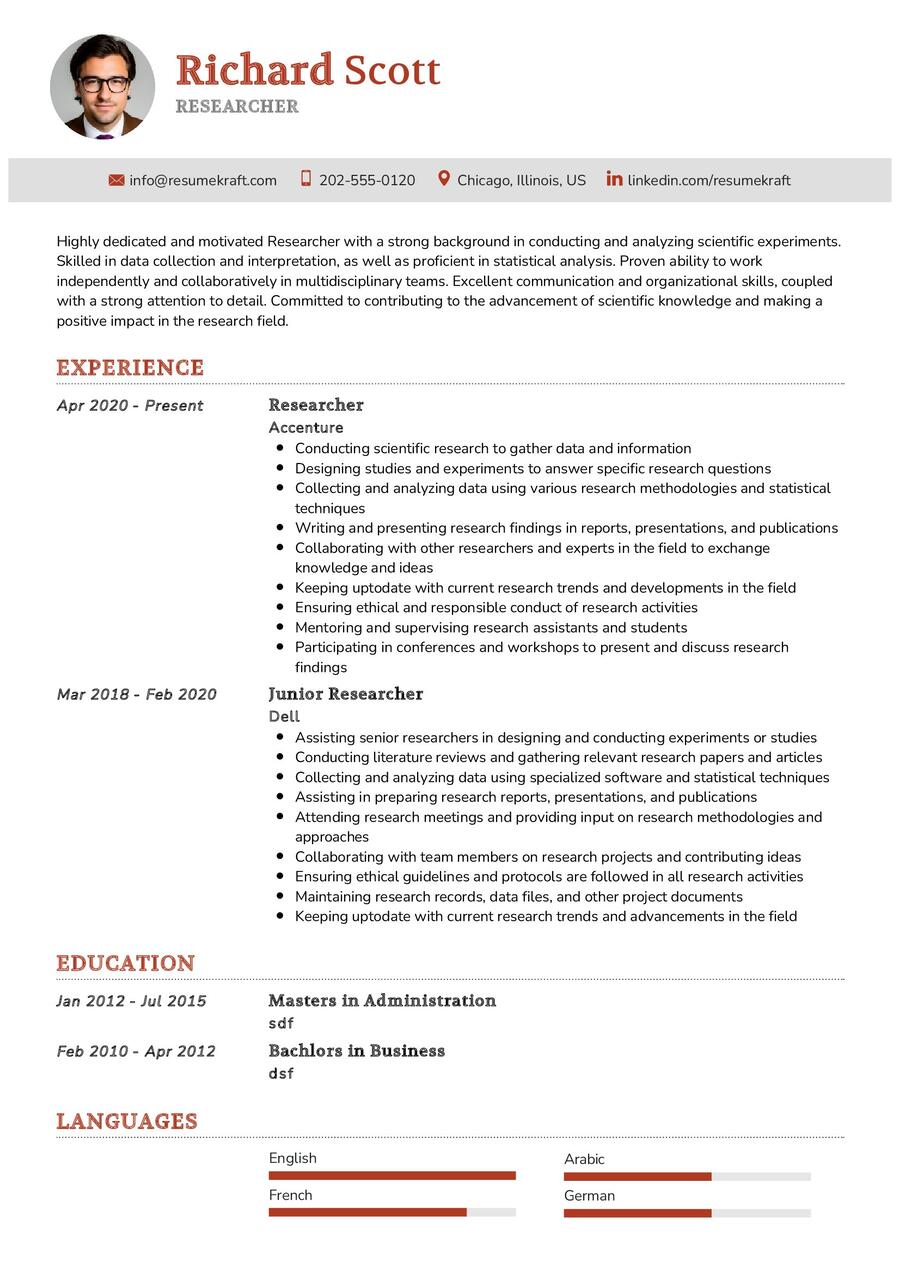Exploring the Role of a Researcher
As the world continues to advance, the role of a Researcher becomes increasingly crucial in various industries. A Researcher is not just a collector of information but a navigator through the vast sea of knowledge. In this article, we’ll delve into the multifaceted role of a Researcher, understanding the skills, responsibilities, and qualifications required for this intellectually stimulating position.
What Does It Take to Be a Researcher?
Being a Researcher is more than just conducting experiments or surveys; it’s about curiosity, critical thinking, and a passion for discovery. Let’s explore the key attributes and qualifications that make a successful Researcher:
- A Bachelor’s or Master’s degree in a relevant field such as Science, Social Sciences, or Humanities, demonstrating a strong foundation in research methodologies.
- Proficient in various research methods, including quantitative and qualitative approaches, and the ability to adapt these methods to different research projects.
- Strong analytical skills to interpret data and draw meaningful conclusions, contributing to the advancement of knowledge in the respective field.
- Excellent communication skills to present findings clearly, whether in written reports, presentations, or academic publications.
- Adaptability and creativity, allowing the Researcher to approach problems from different angles and devise innovative solutions.
- Experience in utilizing research tools and technologies, showcasing a tech-savvy approach to the constantly evolving landscape of research.
Continued education and staying abreast of the latest developments in the specific field of research are vital for a Researcher’s professional growth.
The Responsibilities of a Researcher
A Researcher’s role is diverse, involving various tasks that contribute to the expansion of knowledge and the solution of real-world problems. Let’s break down the core responsibilities that define the day-to-day activities of a Researcher:
- Designing and planning research projects, outlining methodologies and setting clear objectives for data collection and analysis.
- Collecting and analyzing data using appropriate research methods, ensuring accuracy and reliability in the results.
- Conducting literature reviews to understand existing research in the field and identify gaps or areas for further exploration.
- Collaborating with interdisciplinary teams, fostering a holistic approach to complex research problems.
- Presenting research findings at conferences, contributing to academic discourse, and disseminating knowledge to the wider community.
- Staying informed about funding opportunities, preparing grant proposals, and managing research budgets efficiently.
- Mentoring and guiding junior researchers or students, fostering a culture of learning and knowledge-sharing.
Each responsibility demands a combination of methodical precision, critical thinking, and effective communication skills.
Crafting a Compelling Researcher Resume
When it comes to presenting your research prowess on paper, your resume plays a crucial role. Here are some tips to create a Researcher resume that stands out:
- Highlight specific research projects you’ve led or contributed to, emphasizing the impact they had on the respective field.
- Quantify your achievements, using metrics to showcase the scope and significance of your research contributions.
- Showcase your versatility by including various research methods and tools you are proficient in, demonstrating adaptability.
- Include any publications, conference presentations, or awards, providing evidence of your contributions to the academic or professional community.
- Customize your resume for each application, aligning your skills and experiences with the specific requirements of the research position.
Your resume should not just be a list of qualifications but a narrative of your journey as a Researcher and the impact you’ve made in the world of research.
Researcher Resume Summary Examples
Your resume summary is the gateway to your research journey, encapsulating your experiences, skills, and the unique value you bring. Here are some examples to inspire your Researcher resume summary:
- “Dedicated Researcher with a Master’s in Psychology and a proven track record of leading impactful studies on human behavior, contributing valuable insights to the field.”
- “Versatile Researcher with expertise in both quantitative and qualitative methods, recognized for innovative approaches to data analysis and a commitment to advancing scientific knowledge.”
- “Experienced Researcher in the field of Environmental Science, specializing in sustainable practices, and committed to translating research findings into actionable solutions for a greener future.”
Each summary serves as a window into your research journey, offering a glimpse of your expertise and passion for discovery.
The Journey of a Researcher: Experience Section
Your experience section is the chronicle of your research expedition, highlighting the milestones and challenges you’ve conquered. Here are some examples to guide you:
- “Led a team in a groundbreaking study on the impact of climate change on biodiversity, resulting in policy recommendations adopted at the national level.”
- “Contributed to a longitudinal research project on neurodegenerative diseases, collaborating with leading experts and presenting findings at international conferences.”
- “Designed and executed surveys on consumer behavior, providing valuable market insights for industry partners and contributing to strategic decision-making.”
Each experience is a chapter in your research story, narrating the challenges faced, discoveries made, and the lasting impact of your work.
Education Section: The Foundation of Your Research Journey
Your educational background is the bedrock of your research career. Here’s how you can showcase your academic achievements:
- Doctor of Philosophy in Molecular Biology, XYZ University, a journey of in-depth research and specialization, 2018.
- Master of Social Sciences in Economics, ABC University, the foundation stone of your understanding of societal structures, 2014.
- Published research paper: “Advancements in Biotechnology for Sustainable Agriculture,” Journal of Sustainable Science, 2019.
Each educational qualification is a stepping stone, leading you to the pinnacle of success in your research endeavors.
Skills Every Researcher Should Possess
Your skill set is your toolkit, equipped with a diverse range of tools honed over the years. Here are the essential skills that every Researcher should possess:
Soft Skills:
- Curiosity and a passion for learning, the driving force behind every successful research endeavor.
- Critical thinking and analytical skills, essential for interpreting complex data and drawing meaningful conclusions.
- Effective communication, the ability to convey research findings to both academic and non-academic audiences.
- Team collaboration, fostering an environment where diverse perspectives contribute to comprehensive research outcomes.
- Adaptability and resilience, the ability to navigate challenges and refine research approaches based on new insights.
Hard Skills:
- Statistical analysis using software such as SPSS or R, ensuring accuracy and reliability in research findings.
- Proficiency in data visualization tools, translating complex data into accessible and meaningful representations.
- Research design and methodology, the foundation for conducting rigorous and impactful research.
- Literature review and citation management, showcasing a comprehensive understanding of existing research in the field.
- Project management, ensuring the timely and efficient execution of research projects from conception to completion.
Each skill is a tool, aiding you in the pursuit of knowledge and the advancement of your research career.
Common Pitfalls to Avoid in Your Researcher Resume
As you craft your resume, it’s essential to steer clear of common pitfalls that can hinder your chances of landing that dream research position. Here are some mistakes to avoid:
- Being too generic, tailor your resume to highlight your unique contributions and skills relevant to the specific research role.
- Listing duties instead of achievements, provide concrete examples of the impact your research has had or the challenges you’ve overcome.
- Underestimating the importance of a cover letter, use it as an opportunity to convey your passion for research and why you’re the ideal candidate.
- Overusing technical jargon, ensure your resume is accessible to a broader audience, including non-experts in your field.
- Forgetting to proofread, a well-presented and error-free resume reflects positively on your attention to detail.
Avoiding these pitfalls will help you craft a resume that is not only authentic but also compelling for prospective employers.
Key Takeaways for Your Researcher Resume
As we conclude this comprehensive guide, let’s recap the key points to keep in mind while crafting your Researcher resume:
- Highlight the impact of your research, emphasizing the significance of your contributions to the field.
- Quantify achievements, using metrics to showcase the scale and importance of your research outcomes.
- Show versatility, demonstrating proficiency in various research methods and tools.
- Include publications and presentations, providing evidence of your active participation in academic or professional discourse.
Finally, feel free to utilize resources like AI Resume Builder, Resume Design, Resume Samples, Resume Examples, Resume Skills, Resume Help, Resume Synonyms, and Job Responsibilities to create a standout application and prepare for the Researcher job interview.
Armed with these insights and tips, you are now ready to craft a resume that is a true reflection of your journey, your skills, and your aspirations. Remember, your resume is not just a document; it is a canvas where you paint your research story, a story of curiosity, discovery, and meaningful contributions to your field. Best of luck!


